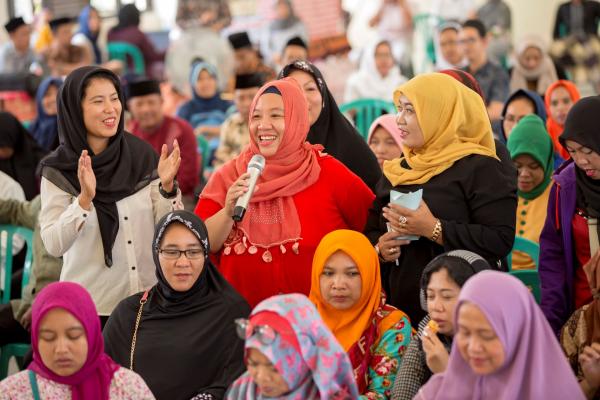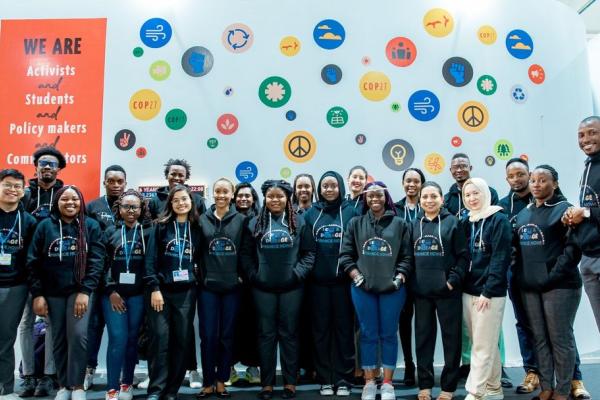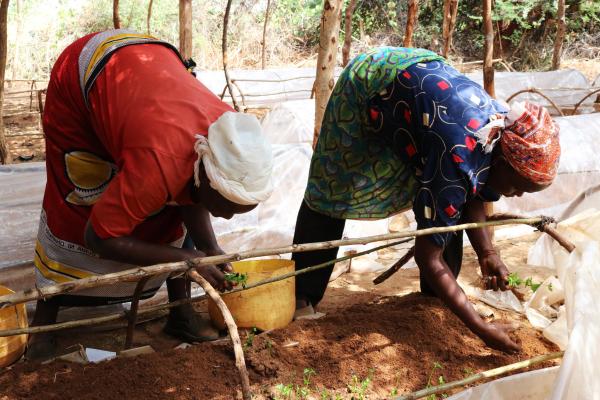Women’s voices and ideas must be prioritised at the highest levels of decision-making

Sarah Little's guest blog is part of The Elders' special International Women's Day 2023 feature. Visit the focus hub.
When I was twenty years old, I set off to hear the stories of young women coming of age amid war, conflict, and displacement. It was 2017, one of the heights of the Syrian civil war. I had spent my early adolescence in the Middle East and, like so many others, I felt devastated every time I turned on the news and saw what was unfolding.
I decided to pause my studies and travel to Jordan, home to the largest refugee camp for Syrians in the Middle East. Little did I know that the girls and young women I met would change my life. They confided in me and trusted me with their stories and secrets. Despite losing their homes, loved ones, and livelihoods, these young women were the bravest and strongest I had ever met. A Syrian friend of mine, Zaad, told me: “We, girls, have many things to share with the world. We just need a chance and a speaker.”
After Jordan, I travelled to one of the largest refugee camps in Africa, Kakuma Camp in northern Kenya. I spent time with young women from Somalia, South Sudan, and Ethiopia. I travelled to Europe, where I met Syrian and Afghan girls resettled in Greece, Belgium, and the UK.
Many girls told me: “I have nowhere to discuss the challenges I face as a girl in my community.” I saw the creative talents of my friends, with nowhere to show it. Women and girls are not only survivors of war and conflict – they are agents of change in their communities. So, I started More to Her Story: a platform for girls to express themselves creatively and discuss their challenges and ideas to make their communities and countries safer and better for all women. More to Her Story has since become a network of more than 3000 young women and girls from more than a dozen countries.
Here are a couple of excerpts of women’s stories from the More to Her Story network, in their own words:
Fatima, 23, Afghanistan
How do you write about your life in a country where women are deprived of their most basic rights? A country whose people still consider women as the second sex. A country full of taboos and rules for women. I am writing about a society in which I (a woman) do not have the right to participate in its political and social issues. I have no identity, no name. Mentioning my name as a woman is forbidden in our society.
If August 15, 2021 was erased from the pages of history, maybe I wouldn't be here today. It was a boring day. A terrible silence covered the whole city. The gates of schools and universities, shops, wedding halls, cafes, and restaurants were all closed. On that day, women disappeared everywhere. After that day, many girls left their work and education and were thrown into wanted and unwanted marriages. 90% of girls did not return to their universities. The number of marriages increased every day because we heard the Taliban were marrying off young girls. The idea that a young, beautiful girl would be forced to marry a giant became a nightmare for us all. My mother worried about me and my three sisters. All parents worried about their daughters, or rather, they worried about their reputations. I had to marry a suitable person my family chose and who paid a price (money) to marry me. I should have said "yes" and become the daughter my parents had always wanted, but I desperately wanted to marry the man I love. So I disobeyed and refused.
Falling in love is a grave crime in my society. There is no greater crime than love. "Girls in love" are stoned. They are secretly killed by their father or brother or they commit suicide. ‘Love’ is still a strange word to say out loud. It is strange because all people are or have once been caught up in this “sin.” The most secret story of Afghan women is their love story, which they do not tell anyone - even themselves - but they never forget.
Elizabeth, 25, South Sudan
I’m South Sudanese, but I was born in Kakuma [Refugee Camp.] I grew up and went to school here. My father died when I was young.
If your father dies in my culture, there is no freedom as a girl. You can’t have a good life. Why? Because people will talk about you, they will say terrible things about you if you have no father. People are always talking about me. If my father were still here, people would not talk badly about me. My father would go and confront those people. If my father were still here, he would say to those people, “Stop talking about her; that is my daughter.” But no one can stand up for you if you don't have a father. You are vulnerable. My mother can't go and ask them why they are talking about me because she's a woman. Women don’t have that kind of power here.
Even though I know getting married would make people stop talking about me, I don’t want to because I don’t want my life to have a lot of problems. If I get married, my husband might beat me, and no one can go and say: “why did you beat my daughter?” If my father was still here, he would say that. That is the problem I’m now facing.
Storytelling is as much about the story as it is about who gets to tell it. More to Her Story acts as a vehicle through which young women and girls can be agents of change and reclaim the narratives of their lives - which have too often been stolen from them by factors beyond their control. At a time when women’s rights are under threat globally, from Afghanistan to Iran, and in parts of Europe and the United States, our voices and ideas must not just be heard - but prioritised - at the highest levels of decision-making. Because history has shown us time and time again that keeping women and girls at the forefront of the global agenda is essential to achieving lasting peace and prosperity.





